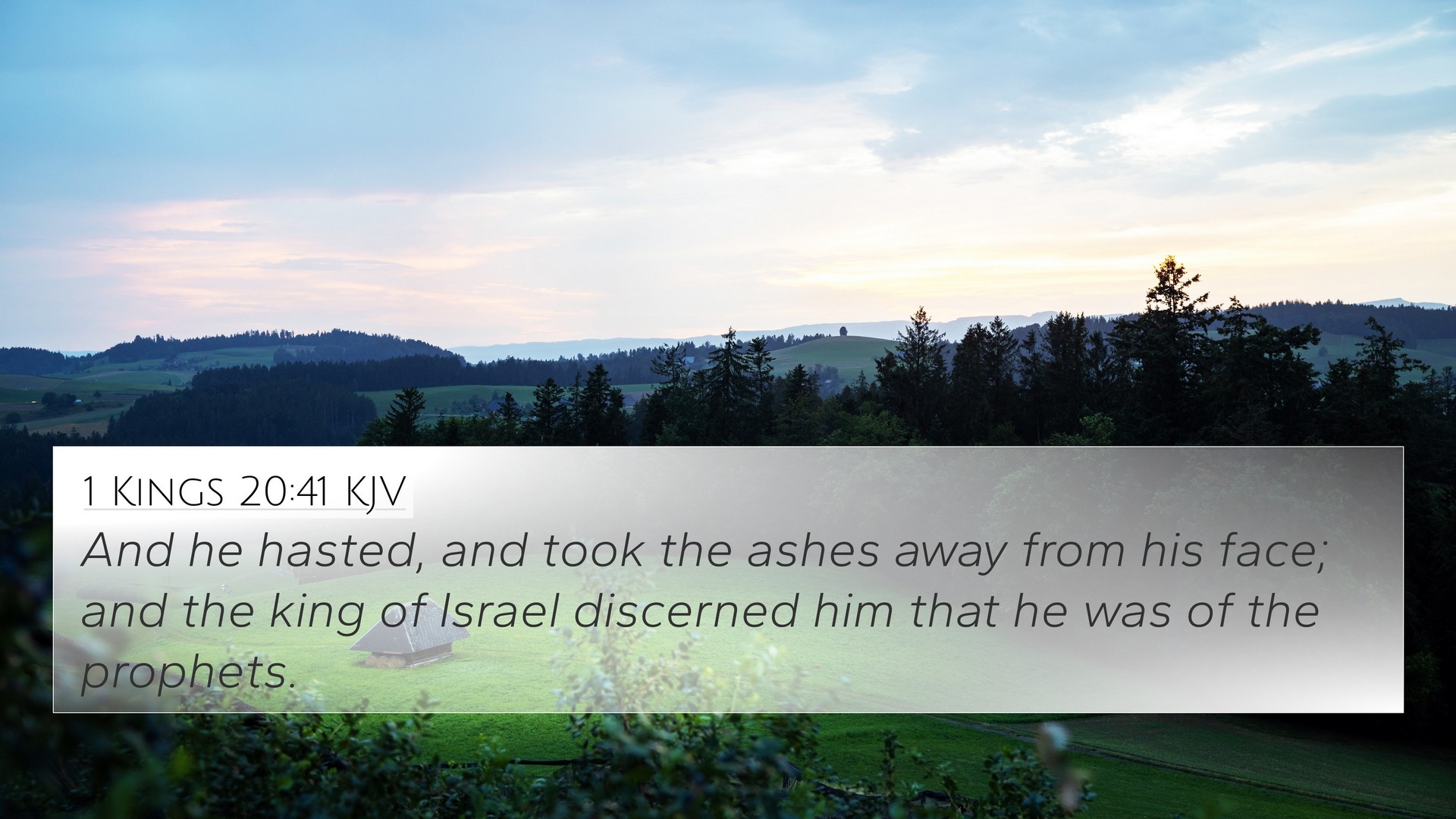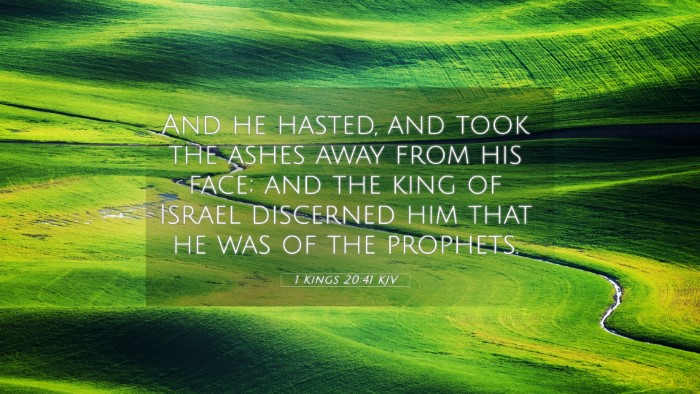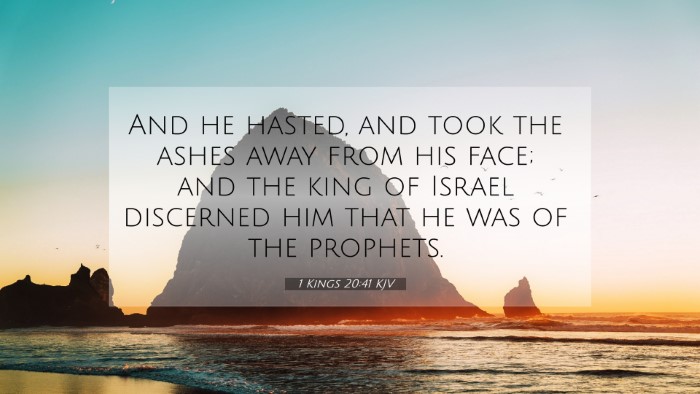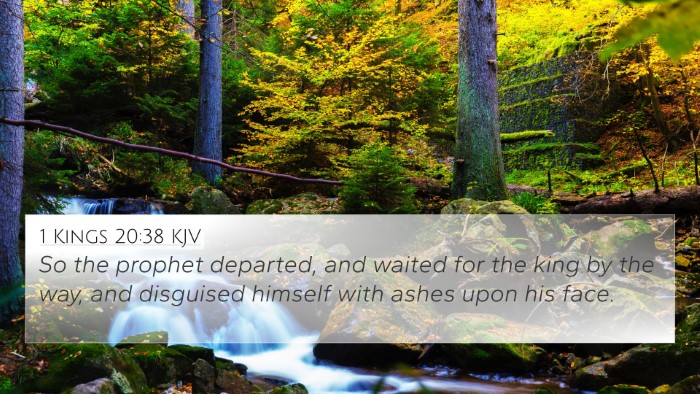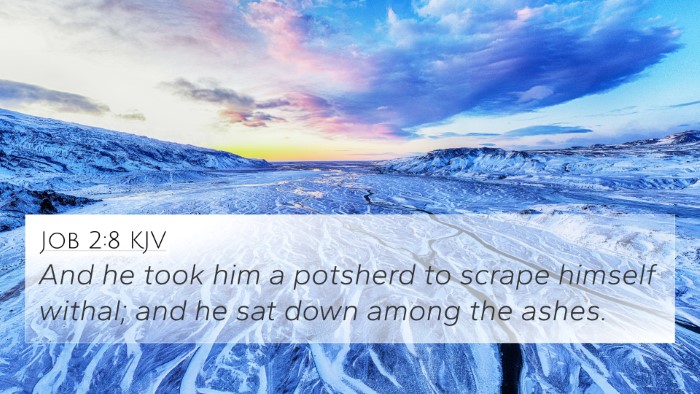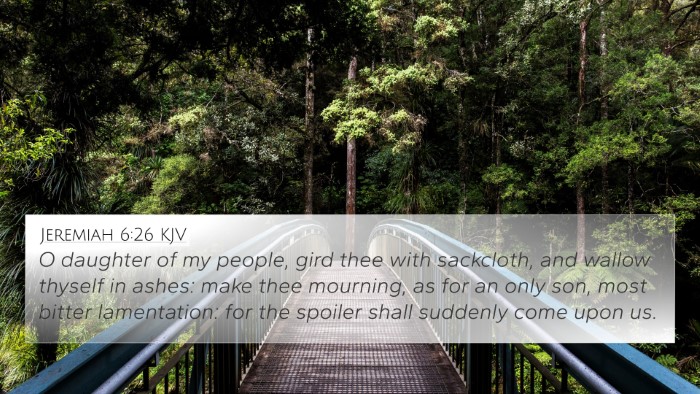Understanding 1 Kings 20:41
Verse: “And he hasted, and took the ashes away from his face; and the king of Israel discerned him that he was of the prophets.” (1 Kings 20:41, KJV)
Summary of 1 Kings 20:41
This verse marks the moment when a prophet, disguised as a wounded soldier, reveals God's message to King Ahab of Israel. The references to ashes speak to a common practice of mourning or repentance, symbolizing humility before the divine message being delivered.
Commentary Insights
Matthew Henry's Commentary: Henry highlights the significance of the prophet's urgency and clear representation of God's message to Ahab. The ashes on the prophet's face symbolize his mourning state, reflecting the gravity of the situation and the divine message. The discerning of the king reveals the spiritual recognition that Ahab possesses to an extent, which aligns with God’s intention to hold Ahab accountable for his actions.
Albert Barnes' Notes: Barnes emphasizes that the act of taking the ashes from his face reveals the prophet's transformation back into a messenger for God, shedding his disguise. This act underscores the prophetic call and God's authority over the kingdom of Israel. Ahab's ability to discern the prophet signifies a partial understanding of his prophetic mission but also warns him of his impending judgment due to his disobedience.
Adam Clarke’s Commentary: Clarke elaborates on the deeper symbolism captured in this narrative. He explains that the ashes are not merely for show; they represent a state of humility before God. Additionally, the recognition of the prophet underscores the conflicts Ahab faces, torn between acknowledging the truth and remaining in rebellion against God.
Bible Cross-References
This verse has thematic connections with other scriptural texts that enhance its interpretation:
- 2 Samuel 12:1-15: The story of Nathan confronting David serves as a parallel in delivering God’s message of rebuke.
- Isaiah 30:10: The prophets often faced rejection, paralleling Ahab’s resistance to God’s warnings.
- 1 Kings 18:17-18: The confrontation between Elijah and Ahab illustrates the prophetic challenge in Israel.
- 2 Chronicles 18:7: Ahab's reliance on false prophets reflects his spiritual blindness in contrast to the true prophet.
- James 5:17: Talks about Elijah as a prophet showing the power of prayer, drawing connections between prophets and their impact.
- Matthew 23:37: Jesus laments over Jerusalem, equating the rejection of prophets with Ahab’s disregard for God’s truths.
- 1 Peter 5:5: The theme of humility, as the prophet demonstrates when he covers his face with ashes.
Connecting Themes
This verse exemplifies several key themes in Scripture:
- Divine Judgment: Ahab’s interactions with prophets reflect God’s justice in Israel.
- Role of Prophets: The distinct function of prophets as messengers of God’s will amid disobedience is evident.
- Spiritual Discernment: Ahab’s ability to discern the prophet indicates the need for spiritual sensitivity.
- Repentance and Humility: The symbolism of ashes underscores a call to genuine repentance before God’s judgment.
Conclusion
This analysis of 1 Kings 20:41 illustrates the complex relationship between prophecy, judgment, and humility before God. Through cross-referencing related Bible verses, we locate this specific passage within the broader narrative of biblical themes concerning divine revelation and obedience. It invites readers to consider their own responses to God's messages in light of Biblical teachings.
For deeper understanding, utilizing a comprehensive Bible cross-reference guide can expand the exploration of inter-Biblical dialogue, especially in linking Old and New Testament themes.
